Read Surname Ancestry ResultsOur indexes 1000-1999 include entries for the spelling 'read'. In the period you have requested, we have the following 2245 records (displaying 1431 to 1440): Single Surname Subscription | | | Buying all 2,245 results of this search individually would cost £13,414.00. But you can have free access to all 2,245 records for a year, to view, to save and print, for £100. Save £13,314.00. More... |
These sample scans are from the original record. You will get scans of the full pages or articles where the surname you searched for has been found. Your web browser may prevent the sample windows from opening; in this case please change your browser settings to allow pop-up windows from this site. Insolvents imprisoned for debt in England and Wales
(1851)
Perry's Bankrupt and Insolvent Gazette, issued monthly, included brief notices of insolvents' estates surrendered to assignees. Each entry gives the surname and christian name of the insolvent, trade and address, followed by the name of the prison. This is the index to the names of the insolvents, from the issues from January to December 1851.READ. Cost: £6.00.  | Sample scan, click to enlarge

| Insolvents in England and Wales
(1851)
Perry's Bankrupt and Insolvent Gazette, issued monthly, included lists of insolvencies and stages in the process whereby the insolvents petitioned for release from debtors' prison. The insolvent is generally referred to by name (surname first), address and trade. This is the index to the names of the insolvents, from the issues from January to December 1851.READ. Cost: £6.00.  | Sample scan, click to enlarge
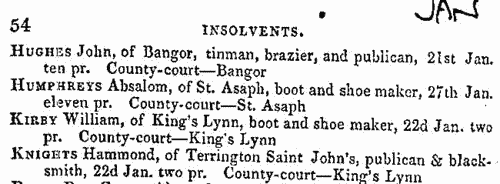
| Masters of Merchantmen and Shippers
(1851)
The London Mercantile Journal and Colonial Advocate, a weekly newspaper, published a report entitled Ships Entered Outwards, listing vessels registered with customs in the Port of London as preparing to leave for abroad. Under each day's heading each entry gives, first, the main port of destination; then the name of the ship; then the surname of the captain; nationality of the ship (e. g., B for British, D for Dutch, &c.); tonnage; the dock (e. g., W I D for West India Dock); and the name of the shipper or agent. These are the returns for November 1851. (The sample scan is from February)READ. Cost: £6.00.  | Sample scan, click to enlarge

| Masters of Merchantmen and Shippers
(1851)
The London Mercantile Journal and Colonial Advocate, a weekly newspaper, published a report entitled Ships Entered Outwards, listing vessels registered with customs in the Port of London as preparing to leave for abroad. Under each day's heading each entry gives, first, the main port of destination; then the name of the ship; then the surname of the captain; nationality of the ship (e. g., B for British, D for Dutch, &c.); tonnage; the dock (e. g., W I D for West India Dock); and the name of the shipper or agent. These are the returns for October 1851. (The sample scan is from February)READ. Cost: £6.00.  | Sample scan, click to enlarge

| Masters of Merchantmen and Shippers
(1851)
The London Mercantile Journal and Colonial Advocate, a weekly newspaper, published a report entitled Ships Entered Outwards, listing vessels registered with customs in the Port of London as preparing to leave for abroad. Under each day's heading each entry gives, first, the main port of destination; then the name of the ship; then the surname of the captain; nationality of the ship (e. g., B for British, D for Dutch, &c.); tonnage; the dock (e. g., W I D for West India Dock); and the name of the shipper or agent. These are the returns for June 1851. (The sample scan is from February)READ. Cost: £6.00.  | Sample scan, click to enlarge

|  Police constables lodging over stables at Park Prospect, Westminster
(1851) Police constables lodging over stables at Park Prospect, Westminster
(1851)
In the 1851 census, Westminster superintendent registrar's district, St Margaret's registrar's district, enumeration district 6 comprised part of St Margaret's parish and St Margaret's ecclesiastical district in the city of Westminster. HO 107/1480
READ. Cost: £2.00.  | Sample scan, click to enlarge

| Pupil Teachers in Gloucestershire: Boys
(1851)
The Committee of Council on Education awarded annual grants for the training and support of pupil teachers and stipendiary monitors in schools in England, Wales, Scotland, the Isle of Man and the Channel Islands. Pupil teachers started training between the ages of 13 and 15, and 'must not be subject to any bodily infirmity likely to impair their usefulness as Pupil Teachers, such as scrofula, fits, asthma, deafness, great imperfections in the sight or voice, the loss of an eye from constitutional disease, or the loss of an arm or leg, or the permanent disability of either arm or leg, curvature of the spine, or a hereditary tendency to insanity'.
They also had to obtain certificates from the managers of the school (and their clergyman, in the case of Church of England schools) as to their moral character and that of their family; good conduct; punctuality, diligence, obedience, and attention to duty; and attentiveness to their religious duties.
This detailed statement in the annual report of the committee for the year ending 31 October 1851 lists schools by county, giving:
1. Name and Denomination of School, with these abbreviations - B, British and Foreign School Society; F. C., Free Church of Scotland; H. C., Home and Colonial School Society; N., National Society, or connected with the Church of England; R. C., Roman Catholic Poor-School Committee; Wesn., Wesleyan Methodist.
2. Annual grants conditionally awarded by the committee in augmentation of teachers' salaries, and in stipends to apprentices, and gratuities to teachers.
3. Month in which annual examination was to be held.
4. Names of apprentices, giving surname and initials, and year of apprenticeship. Stipendiary monitors are indicated by (S. M.).READ. Cost: £6.00.  | Sample scan, click to enlarge
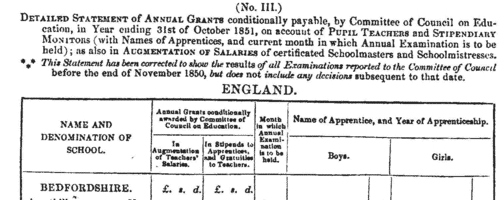
| Pupil Teachers in Surrey: Boys
(1851)
The Committee of Council on Education awarded annual grants for the training and support of pupil teachers and stipendiary monitors in schools in England, Wales, Scotland, the Isle of Man and the Channel Islands. Pupil teachers started training between the ages of 13 and 15, and 'must not be subject to any bodily infirmity likely to impair their usefulness as Pupil Teachers, such as scrofula, fits, asthma, deafness, great imperfections in the sight or voice, the loss of an eye from constitutional disease, or the loss of an arm or leg, or the permanent disability of either arm or leg, curvature of the spine, or a hereditary tendency to insanity'.
They also had to obtain certificates from the managers of the school (and their clergyman, in the case of Church of England schools) as to their moral character and that of their family; good conduct; punctuality, diligence, obedience, and attention to duty; and attentiveness to their religious duties.
This detailed statement in the annual report of the committee for the year ending 31 October 1851 lists schools by county, giving:
1. Name and Denomination of School, with these abbreviations - B, British and Foreign School Society; F. C., Free Church of Scotland; H. C., Home and Colonial School Society; N., National Society, or connected with the Church of England; R. C., Roman Catholic Poor-School Committee; Wesn., Wesleyan Methodist.
2. Annual grants conditionally awarded by the committee in augmentation of teachers' salaries, and in stipends to apprentices, and gratuities to teachers.
3. Month in which annual examination was to be held.
4. Names of apprentices, giving surname and initials, and year of apprenticeship. Stipendiary monitors are indicated by (S. M.).READ. Cost: £6.00.  | Sample scan, click to enlarge
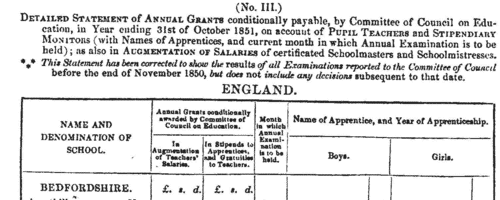
| Pupil Teachers in Wiltshire: Boys
(1851)
The Committee of Council on Education awarded annual grants for the training and support of pupil teachers and stipendiary monitors in schools in England, Wales, Scotland, the Isle of Man and the Channel Islands. Pupil teachers started training between the ages of 13 and 15, and 'must not be subject to any bodily infirmity likely to impair their usefulness as Pupil Teachers, such as scrofula, fits, asthma, deafness, great imperfections in the sight or voice, the loss of an eye from constitutional disease, or the loss of an arm or leg, or the permanent disability of either arm or leg, curvature of the spine, or a hereditary tendency to insanity'.
They also had to obtain certificates from the managers of the school (and their clergyman, in the case of Church of England schools) as to their moral character and that of their family; good conduct; punctuality, diligence, obedience, and attention to duty; and attentiveness to their religious duties.
This detailed statement in the annual report of the committee for the year ending 31 October 1851 lists schools by county, giving:
1. Name and Denomination of School, with these abbreviations - B, British and Foreign School Society; F. C., Free Church of Scotland; H. C., Home and Colonial School Society; N., National Society, or connected with the Church of England; R. C., Roman Catholic Poor-School Committee; Wesn., Wesleyan Methodist.
2. Annual grants conditionally awarded by the committee in augmentation of teachers' salaries, and in stipends to apprentices, and gratuities to teachers.
3. Month in which annual examination was to be held.
4. Names of apprentices, giving surname and initials, and year of apprenticeship. Stipendiary monitors are indicated by (S. M.).READ. Cost: £6.00.  | Sample scan, click to enlarge
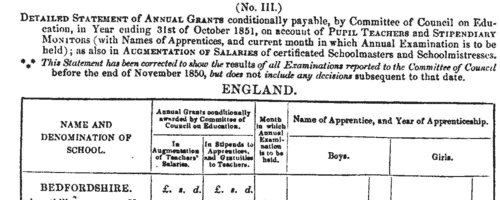
| Pupil Teachers in Wiltshire: Girls
(1851)
The Committee of Council on Education awarded annual grants for the training and support of pupil teachers and stipendiary monitors in schools in England, Wales, Scotland, the Isle of Man and the Channel Islands. Pupil teachers started training between the ages of 13 and 15, and 'must not be subject to any bodily infirmity likely to impair their usefulness as Pupil Teachers, such as scrofula, fits, asthma, deafness, great imperfections in the sight or voice, the loss of an eye from constitutional disease, or the loss of an arm or leg, or the permanent disability of either arm or leg, curvature of the spine, or a hereditary tendency to insanity'.
They also had to obtain certificates from the managers of the school (and their clergyman, in the case of Church of England schools) as to their moral character and that of their family; good conduct; punctuality, diligence, obedience, and attention to duty; and attentiveness to their religious duties.
This detailed statement in the annual report of the committee for the year ending 31 October 1851 lists schools by county, giving:
1. Name and Denomination of School, with these abbreviations - B, British and Foreign School Society; F. C., Free Church of Scotland; H. C., Home and Colonial School Society; N., National Society, or connected with the Church of England; R. C., Roman Catholic Poor-School Committee; Wesn., Wesleyan Methodist.
2. Annual grants conditionally awarded by the committee in augmentation of teachers' salaries, and in stipends to apprentices, and gratuities to teachers.
3. Month in which annual examination was to be held.
4. Names of apprentices, giving surname and initials, and year of apprenticeship. Stipendiary monitors are indicated by (S. M.).READ. Cost: £6.00.  | Sample scan, click to enlarge
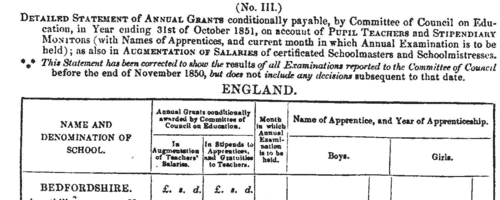
|
Research your ancestry, family history, genealogy and one-name study by direct access to original records and archives indexed by surname.
|













